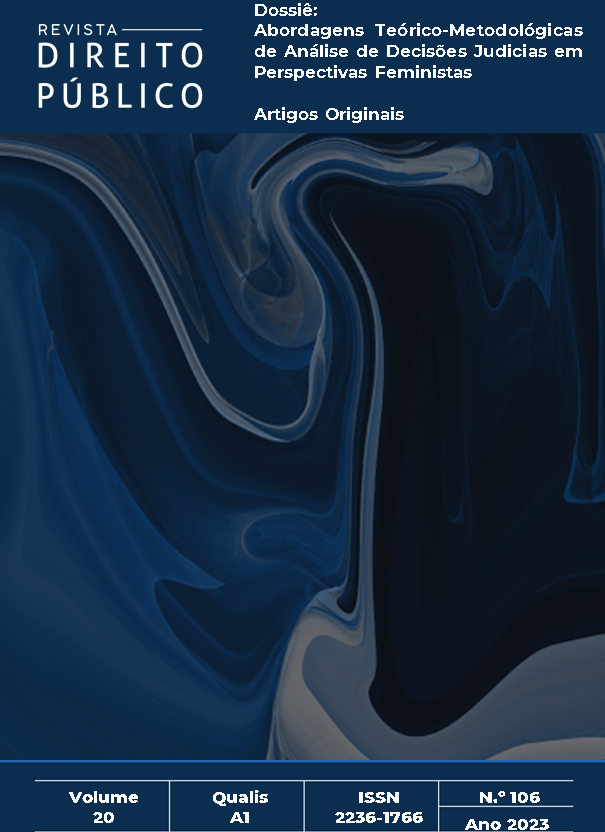GENDER PERSPECTIVE PROTOCOL FOR JUDGEMENT: OPENING TO AN EPISTEMOLOGICAL CHANGE IN LAW AND LEGAL PRACTICE IN BRAZIL
Abertura para uma Mudança Epistemológica no Direito e na Prática Jurídica no Brasil
DOI:
https://doi.org/10.11117/rdp.v20i106.7137Abstract
The objective of this study is to verify the impact of the Gender Perspective Protocol for Judgement on overcoming gender-based violence, especially regarding the arguments presented to the Judiciary and the practice of legal professionals in the institutional context. The hypothesis raised is if the Protocol will effectively enable the parties involved in the legal process to identify if the demand involves gender issues and to what extent they should be considered and treated in the proceedings and judgments of cases in various branches of the Judiciary. To answer these questions, the first part of the Protocol is analyzed to determine if the concepts, theories and methodologies adopted for the inclusion of feminist perspective in judicial activity are adequate. This analysis allows a preliminary conclusion, that the Protocol should be reviewed by a pluralistic working group in order to encompass all actors in the judicial activity and because it presents some errors in the theorical an methodological aspects. Next, using decolonial feminisms as a reference, demonstrates the need of an epistemological rupture in the Law itself and for the reconstruction of knowledge and legal practice to effectively overcome gender violence. Based on these analyses, concluded that, even though pluralistic revision may be necessary, the Protocol is applicable and has compelling force and must be articulated concurrently with other teaching-learning strategies that incorporate feminist perspective into the formation of legal professionals in Brazil.
Downloads
Published
How to Cite
Issue
Section
License
Copyright (c) 2023 Direito Público

This work is licensed under a Creative Commons Attribution-NonCommercial 4.0 International License.
O(s)/A(s) autores(as) dos manuscritos submetidos concorda(m) com as regras a seguir:
1) Todos os autores e autoras participaram do trabalho, são responsáveis pelas ideias e conceitos nele emitidos e atestam sua conformidade com os princípios éticos exigidos.
2) Todos os autores e autoras concordam com a forma final do trabalho e em ceder os direitos para publicação nos canais de publicação da Escola de Direito do IDP.
3) Todos os autores e autoras informam que o manuscrito é de sua autoria e assumem a responsabilidade pelo trabalho, declarando que a obra a ser publicada não infringe quaisquer direitos de propriedade intelectual de terceiros.
3.1) Em caso de submissão simultânea, além da reprovação imediata do artigo e comunicação ao(s) respectivo(s) periódico(s), a Revista Direito Público se reserva o direito de não receber novas submissões de todos os autores implicados pelo prazo de 2 (dois) anos, contado a partir da data de ciência do fato.
4) Todos os autores e autoras autoriza(m) a edição de seu trabalho e cede(m) à Escola de Direito do IDP os direitos de autor para reproduzir, editar e publicar ou veicular o citado trabalho em qualquer forma midiática, resguardada a autoria, em particular sob forma digital, em arquivo eletrônico online na Internet, bem como armazená-los em seu repositório de acordo com o desenvolvimento do processo editorial. Esta concessão não terá caráter oneroso para a Escola de Direito do IDP, não havendo remuneração sob qualquer modalidade pela utilização do referido material, tendo este o caráter de colaboração científica.












